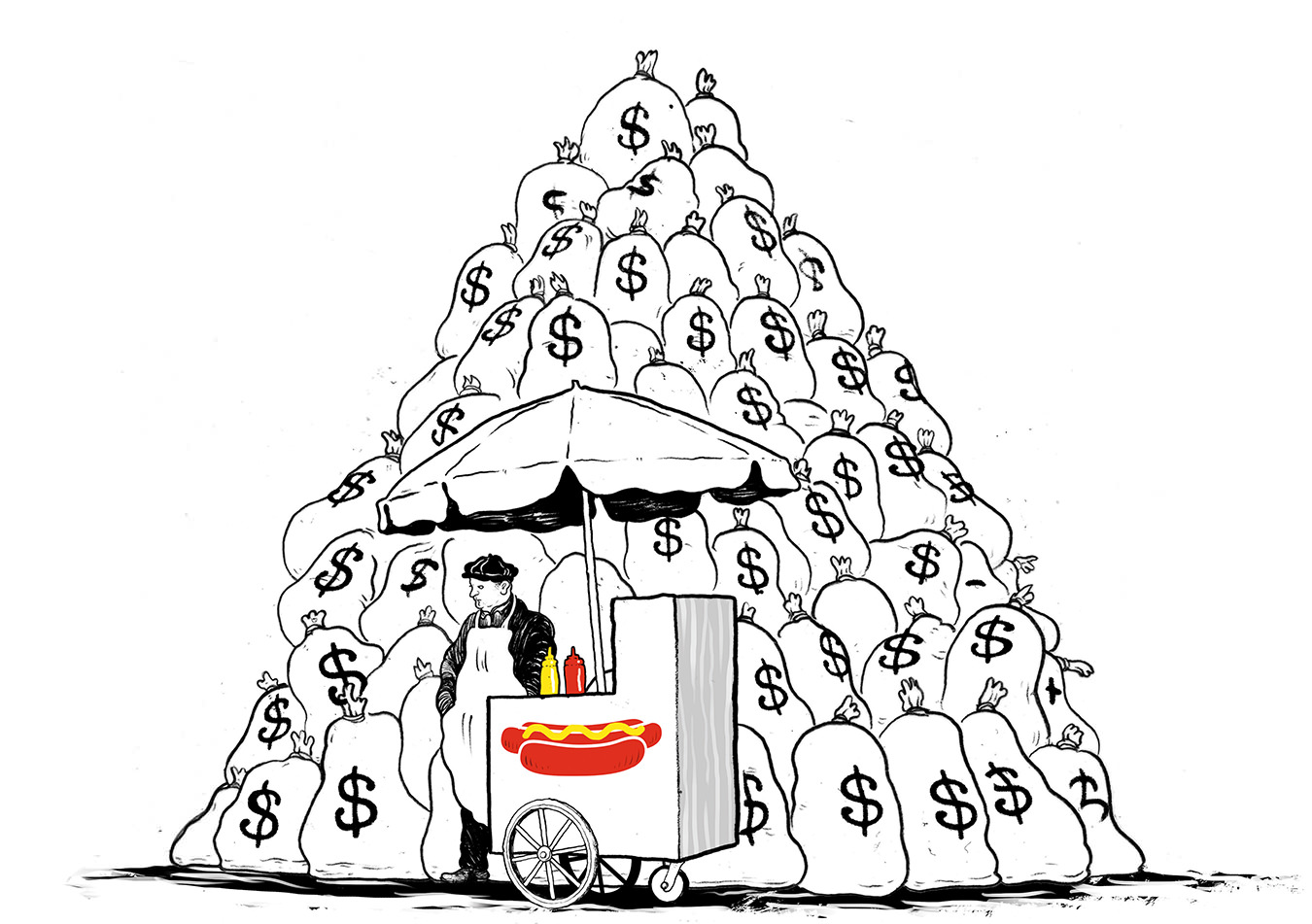Hedge Funds
A matter of death and life.

Annus horribilis. Of all the ways to describe the experience of hedge fund investors in 2008, none come quite as close as this to capturing the sense of disillusion and despair at a year in which the best-laid financial schemes went spectacularly awry.
Consider: over the course of 12 tumultuous months, the Credit Suisse/Tremont Hedge Fund Index, a broad measure of the performance of more than 5,000 hedge funds from around the world, lost fully 19.07 per cent of its value. Specific subcategories within the broader index fared considerably worse. All in all, the performance was so abysmal that 1,471 hedge funds—roughly 15 per cent of the industry total—packed it in and went out of business.
It wasn’t supposed to be this way. When Alfred Jones conceived of the hedge fund back in 1949, the idea was elegantly simple: offset traditional long positions with select short sales within a single fund. By selling stocks he thought would decline in value (“shorting”) while simultaneously investing in others he thought would appreciate (“going long”), Jones was not only able to “hedge” his positions against market-wide risk, he attained the holy grail of the financial world: a pooled fund capable of making money in both good markets and bad.
The idea worked. For years, Jones’s fund outperformed traditional asset managers by a wide margin. Then, in 1966, an exposé in Fortune magazine let the world in on Jones’s secret—and the performance that came along with it. In the 10 years before the article’s publication, Jones’s fund had beaten the best-performing mutual fund of the day (the Dreyfus fund) by a stunning 87 per cent. This despite the fact that Jones took 20 per cent of profits for himself. In the 34 years Jones ran his fund, his investors lost money in only three years.
So much for that idea. In a year punctuated by record-busting losses in nearly all asset classes, investors came to realize that hedge funds were far from the financial cure-all they were assumed to be. In fact, those funds specifically designed to minimize stock market risk—“equity market neutral” funds in industry parlance—turned out to be the worst performers of the bunch, turning in a loss of 40.32 per cent.
Little wonder that hedge fund investors spent much of the year running for the exits. As the financial sector collapsed and economic Armageddon seemed ever more certain, investors voted with their feet, withdrawing nearly $200-billion from hedge funds over the course of the year. To stem the tide, many hedge funds enacted gates—restrictive clauses that prevented investors from cashing out for several months. Hardly a popular move.
To add insult to injury, in 2008 the stench of financial fraud rose over the hedge fund industry. Bernard Madoff, former chairman of the NASDAQ stock exchange and respected manager of an extraordinary investor fund that posted impossibly consistent returns for nearly 18 years straight, gained infamy as the most audacious financial fraudster in history, bilking well-heeled celebrities, charities, international banks, and other high-net-worth investors out of an estimated $64.8-billion.
While industry insiders point out that Madoff’s so-called investment fund wasn’t technically structured as a hedge fund, to victims, the distinction looks like nothing more than splitting hairs. Many of the feeder funds that funnelled billions of dollars into Madoff’s mother of all Ponzi schemes were, in fact, hedge funds. The fact that these were run by some of the most respected private banks and financial institutions in the world, among them alternative investment giant Man Group plc, and the euro area’s largest bank, Banco Santander, only rubs salt into the wound.
A Horror Show
One person who’s had a front row seat throughout these troubled times has been Jim McGovern. As the CEO of Arrow Hedge Partners, Canada’s second-largest hedge fund management firm, McGovern is responsible for the safekeeping of about $750-million of his investors’ wealth. When he looks back on the performance of hedge funds in 2008, he doesn’t mince words.
“Last year was best described as a horror show,” McGovern admits with characteristic candour. “Everything that could go wrong did.”
Looking back, however, McGovern believes that blame for the disaster shouldn’t be laid solely at the feet of the people in charge of the money. “The greatest challenges in 2008 were largely outside the expectations of most of the managers,” he says.
At the top of that list is what McGovern labels the “unexpected and arbitrary” short-selling restrictions introduced by the United States Securities and Exchange Commission in July 2008. Intended to prevent destabilizing speculation in a basket of systemically important U.S. financial stocks, the restrictions effectively eliminated one of the best strategies hedge managers have at their disposal during a time of market upheaval. As a result of the restrictions, hedge funds were immediately forced to unwind their short positions, in many cases at significant losses.
When it comes to investing, the bottom line is, in fact, the bottom line. Hedge funds as a whole still performed better than the broader equity market in both Canada and the U.S.
As McGovern explains, these losses triggered a rush for liquidity among supposedly sophisticated hedge fund investors. “Sophisticated investors or unsophisticated—when people start losing money, they get worried. Everybody sees this going on, and [they say], ‘Hey, I’d like my money back!’ ”
This demand for cash couldn’t have happened at a worse time. Funds that made it easy for investors to get their money back (typically with 30 days’ notice) were forced to liquidate holdings in the middle of a market panic—usually not the best way for an investment fund to ensure its ongoing survival. On the other hand, funds that were able to delay, suspend, or otherwise prevent redemptions were able to hang on to their holdings and survive. Ironically, such draconian measures turned out to be a recipe for success once the panic was over. “Managers who had a one-year lock up or a gate of some kind were able to … buy assets on the cheap and subsequently make a fortune,” says McGovern.
To some degree, this is exactly what hedge funds were intended to do—turn panic into profit, and make money from market misfortune. Could it be that hedge funds let their clients down at precisely the moment when they were expected to perform?
“That’s a tough question,” McGovern says. “If the fund was purchased on the premise of low correlation [to traditional asset classes] and positive absolute returns, then only a handful of hedge funds lived up to that promise.” Then again, McGovern believes the problem stems at least in part from unreasonable expectations. Simply put, investors believed that hedge funds were a fool-proof, no-lose proposition. And it was a myth that many of the hedge fund firms were only too happy to propagate. “When you see the amount of money that went into [hedge funds], there was definitely panacea-type buying,” McGovern admits. “And probably some panacea-type marketing as well.”
But here again McGovern is careful with his criticism. When it comes to investing, the bottom line is, in fact, the bottom line. Hedge funds as a whole still performed better than the broader equity market in both Canada and the U.S. “The math is pretty simple,” McGovern says. “It’s easier to recover from a 19 per cent loss than from a 35 to 40 per cent loss.”
It’s a compelling argument. But it’s unlikely to convince those (among them, the Obama administration) calling for tougher regulation, stricter enforcement, and greater oversight of an industry known for its anything-goes mentality. On this point, McGovern acknowledges that change is in the air. “Investors will demand better terms,” he says, “in particular on issues of transparency and fees. Investors need to understand what they are paying for and whether that makes sense.”
Unsurprisingly, McGovern is not a fan of this increased regulation and oversight. “Regulation is not a cure-all,” he says. “I fear people may rely on regulation as a stamp of quality rather than doing proper due diligence.” To McGovern, the problem is not one of insufficient regulation, but rather insufficient enforcement. “The biggest take-away from the crisis has been lack of enforcement of existing rules and regulations,” he says with conviction. “Either the enforcement has to be better, or the penalties have to be greater.”
Better Times Ahead
What does McGovern see for the future of his industry? “Recovery,” he says with alacrity. Despite the current turmoil, McGovern firmly believes there are better times ahead for hedge funds. “Hedge funds will adapt and the industry will grow again, albeit in a likely more measured and deliberate pace.”
No one can complain that McGovern doesn’t put his money where his mouth is: he freely acknowledges the bulk of his net worth is invested in his firm’s funds. And looking back at a year where everything went wrong, he believes this was the one thing that went right: while the Canadian stock market was down 35 per cent, McGovern’s personal portfolio of hedge funds lost a mere 15 per cent. “This is the ultimate stress test,” McGovern says.
It’s also the reason why McGovern still counts himself as part of the hedge fund faithful. “I’m more of a believer now than I’ve ever been,” he says with a note of both satisfaction and certainty.
Which, when you think about it, is exactly what Alfred Jones’s investors must have felt.




